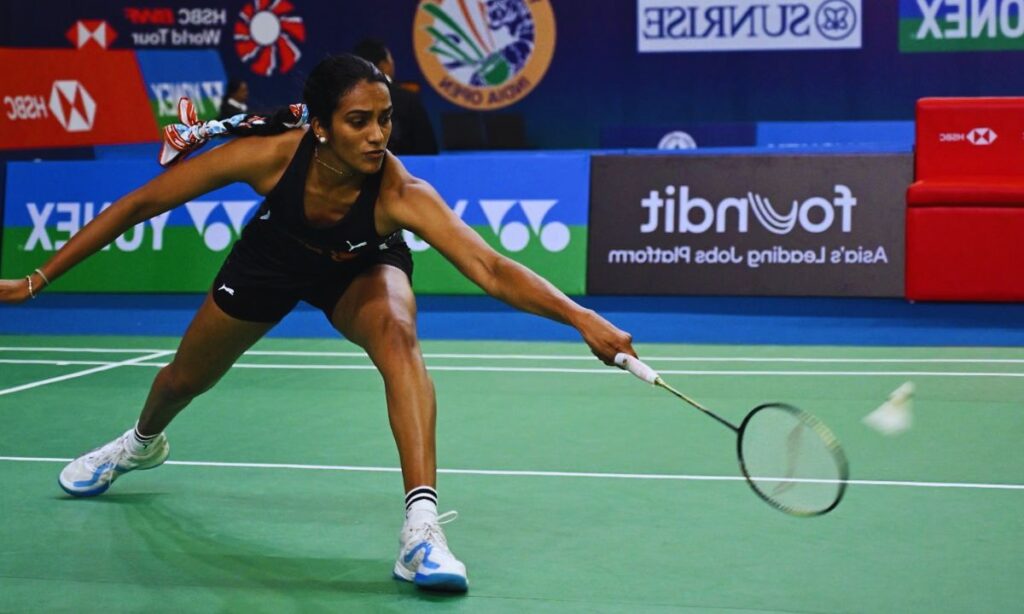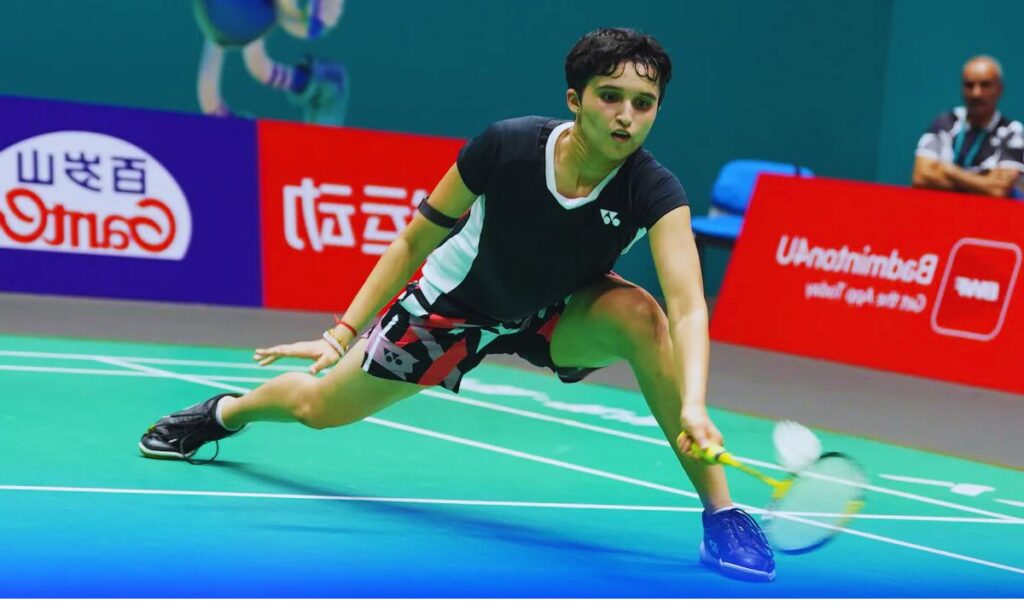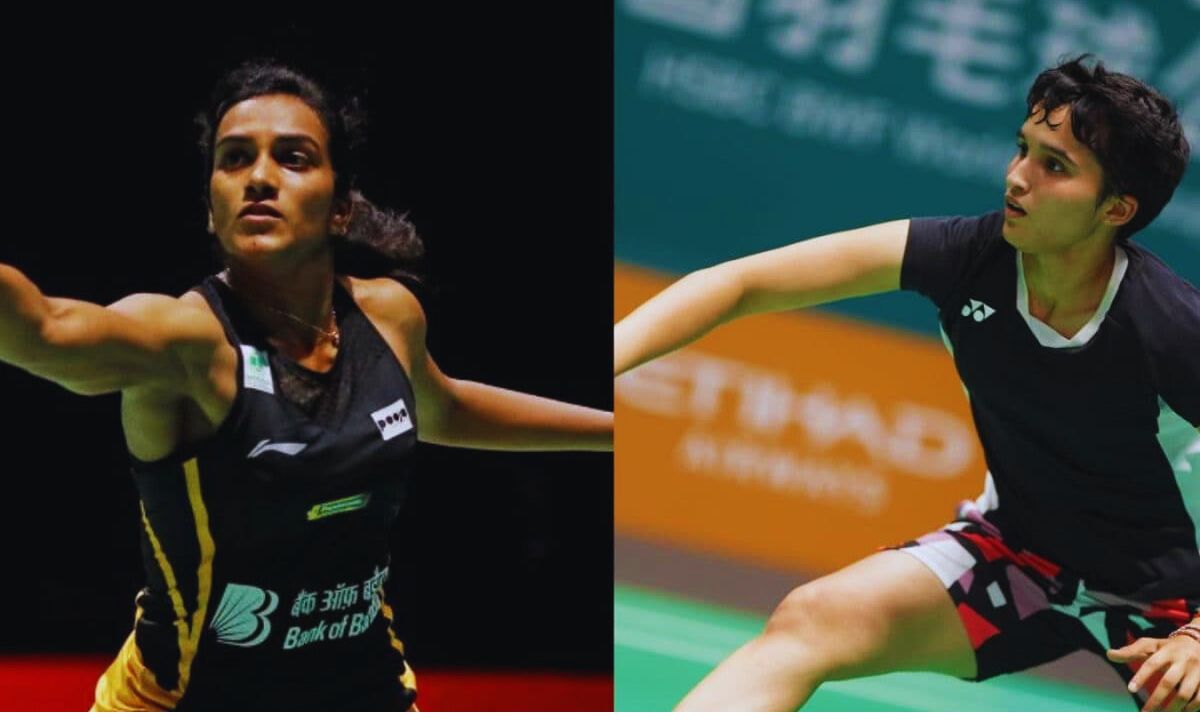In one of the most emotionally charged matches at the China Open, 17-year-old Unnati Hooda stunned the badminton world by defeating two-time Olympic medalist PV Sindhu in a gripping three-game battle. The match, ending 21-16, 19-21, 21-13, marked not just a surprise result but a symbolic shift in Indian badminton—a moment of fearless defiance from youth against legacy.
This wasn’t just another match. It felt like a passing of the torch, even if temporary. In front of a captivated crowd in Changzhou, Hooda showed maturity beyond her years, combining sharp anticipation with a calm and patient mindset. Her post-match words reflected humility and poise: “I stayed patient. I didn’t expect to win, but I gave it my all. It was a good match.”
Hooda’s defense was the foundation of her performance. From the very beginning, she refused to be overwhelmed by Sindhu’s reputation or ranking. Trained in Rohtak by her father and a dedicated group of sparring partners, Hooda had been preparing for this moment not just for days or weeks—but for months. The last time they met, Sindhu overwhelmed her with power at the Syed Modi International in Lucknow. But Hooda, instead of feeling defeated, used that loss as fuel.

Her preparation was intelligent. She expected Sindhu’s trademark smashes and adjusted her game plan accordingly. Instead of trying to overpower Sindhu, Hooda focused on denying her the elevation and timing she needed to land her aggressive shots. She forced Sindhu into awkward positions on the court and made her work hard for every point. It wasn’t brute strength—it was thoughtful disruption.
Sindhu, on the other hand, seemed off rhythm. While her shots still carried punch, her movement lacked the same flow that once defined her dominance. After the match, she admitted some frustration, noting, “She got lucky with the net chords.” That remark stirred conversation—was it bad luck, or was Sindhu simply outplayed by a rising star hungry for recognition?
There’s an undeniable emotional pull in watching a newcomer rise against a legend. Hooda’s win wasn’t just technical—it was personal, passionate, and full of raw ambition. She showed courage in the face of pressure, didn’t buckle under the weight of expectations, and proved that belief combined with preparation can create magic on court.
The audience in Changzhou wasn’t just witnessing an upset; they were watching a transformation. Hooda didn’t just win a match—she announced herself. For Indian fans, it stirred a complex mix of pride and reflection. Pride for a young star breaking through. Reflection on what this means for Sindhu, who continues to struggle with consistency.
Hooda’s strategy revealed a depth that many wouldn’t expect from a 17-year-old. Her ability to read Sindhu’s moves, to slow down the pace when needed, and to push Sindhu into physically taxing positions were all signs of high badminton intelligence. It wasn’t wild aggression. It was calculated, disciplined chaos.
What also made the match compelling was the contrast in their demeanors. Hooda appeared light-footed, nimble, and fully in control of her emotions. Sindhu, though focused, seemed tense at crucial points. In the third game, as the momentum clearly swung Hooda’s way, Sindhu was visibly rattled. The fearlessness of youth met the fatigue of expectation.
Is this win a one-time surprise or the beginning of something bigger? That remains to be seen. But the signs are strong. Hooda’s training ethic, coupled with her tactical brain and mental strength, suggests this isn’t a flash in the pan. She’s been knocking on the door—and now, she’s kicked it open.
Sindhu’s camp may reflect on this match not just in terms of luck or timing but in deeper concerns. Is the era of dominance fading? Is a new wave ready to take over? These are tough questions, but they’re necessary. And while Sindhu remains a giant in Indian sports, this loss could serve as a wake-up call.
In sport, change is constant. But sometimes, it arrives in a single, unforgettable moment. For Indian badminton, Unnati Hooda’s triumph over PV Sindhu could be that moment. A brilliant, emotional, and fearless victory that didn’t just end a match—it started a conversation.
Unnati Hooda’s victory over PV Sindhu didn’t just end with a scoreline—it opened a floodgate of discussion, admiration, and speculation. The Indian badminton community, from fans to former players, was caught between awe and disbelief. While many praised the teenager for her tactical sharpness and maturity beyond her years, others expressed concern over Sindhu’s current form. Either way, the headlines were dominated by one name: Unnati Hooda.
When a young athlete dethrones a legend, the sports world often rushes to define it as a “turning point.” For Unnati Hooda, this was more than a match—it was a statement. It challenged the idea that experience always triumphs over youth. Her game wasn’t just physically sharp, it was emotionally layered, showing grit and grace. She didn’t just win; she inspired.
PV Sindhu, one of India’s most decorated badminton players, has long carried the burden of expectations. With multiple Olympic medals and years of being India’s badminton face, the pressure is relentless. Her recent struggle to reach the final stages of top tournaments is now under scrutiny. This loss to Unnati will sting—not just because of the scoreboard, but because it signals vulnerability, something her opponents will look to exploit.
What truly set Unnati apart was her ability to stay composed under pressure. She didn’t rush her shots, nor did she let Sindhu dictate the tempo. Every return had a purpose. Her court coverage, anticipation, and ability to retrieve powerful smashes showed incredible fitness and mental endurance. It was evident that this wasn’t a fluke—it was the result of months of preparation and reflection.
Many may not know that Unnati Hooda was crushed by Sindhu just months earlier at the Syed Modi International. That match became a defining moment for her—not one of despair, but of determination. Instead of shying away from the challenge, she dug deep into her weaknesses. Her camp worked tirelessly to counter Sindhu’s strengths. That loss laid the foundation for this unexpected triumph.
What’s refreshing about Unnati Hooda is her brand of confidence. It’s not loud or arrogant—it’s quiet and deliberate. She walks onto the court with a sense of belonging. Even in her post-match interview, there was no gloating. She spoke with the sincerity of someone who respects the sport and her opponent. That kind of attitude builds champions, and fans have taken notice.
It’s never easy to play against someone you’ve grown up idolizing. For Unnati, PV Sindhu has always been a symbol of Indian excellence in badminton. To beat her in such a high-stakes tournament carries a complex emotional burden. But Unnati handled it with surprising maturity. She acknowledged Sindhu’s greatness while quietly celebrating her own progress. It was a masterclass in humility.
Analysts watching the match were impressed by Unnati’s tactical game. She wasn’t just reacting—she was planning, predicting, and placing. She drew Sindhu into long rallies and minimized her angles to attack. Every time Sindhu tried to go big with her trademark jump smashes, Unnati had an answer ready. Her ability to absorb pace and reset the rally broke Sindhu’s rhythm and forced uncharacteristic errors.
Unnati’s journey started in Rohtak, Haryana—a town not typically associated with badminton excellence. But under the guidance of her father and a tight-knit group of coaches, she honed her skills far away from the glamour of big academies. There’s something raw and real about her story. It’s about discipline, hunger, and the belief that talent doesn’t need fancy facilities to flourish.
To match the intensity of someone like Sindhu, physical conditioning is non-negotiable. Behind Unnati’s fluid movement and lightning-quick reflexes is a rigorous fitness regime. Core strength, endurance training, and hours of shuttle drills are part of her daily grind. Her agility and stamina were key in this match, especially in the third game, where Sindhu appeared visibly drained while Unnati thrived.
Following her win, Unnati has become the face of every sports headline. From social media buzz to national newspapers, her story is everywhere. But with fame comes pressure. Maintaining focus amid rising expectations will be her next big challenge. Staying grounded and continuing her training without getting distracted will define how far she can really go.
PV Sindhu’s reaction to the match was revealing. While she acknowledged Unnati’s composure, she also hinted at some frustration, particularly with the lucky net chords. These remarks, though not entirely unfair, suggest that Sindhu is struggling to accept how swiftly the landscape of Indian women’s badminton is evolving. Her form, once untouchable, now appears vulnerable to the fire of rising stars like Unnati.
Is Indian badminton ready for a shift in leadership? Sindhu has carried the torch with grace for years, but the emergence of players like Unnati signals a new era. With Saina Nehwal fading from the scene and Sindhu facing a dip in form, fans are looking for the next big name. Unnati may not be ready to carry the full burden just yet, but her arrival is undeniable.
One standout performance can turn heads, but consistency is what builds legacies. Unnati’s biggest challenge now will be to replicate this form across tournaments. Opponents will now prepare specifically for her. How she adapts, improves, and grows from here will determine if she’s a future champion or just a one-tournament wonder.
What made Unnati’s win special wasn’t just the technique or scoreline. It was the quiet emotion that simmered beneath her calm exterior. Every rally, every retrieval, every drop shot carried years of hard work. As the final point was played and the crowd erupted, Unnati’s eyes didn’t just show joy—they reflected relief, pride, and a thousand sacrifices that brought her to this moment.
Across India, young shuttlers watched Unnati’s win with wide eyes and newfound hope. If a teenager from a small town could defeat an Olympic medalist, then maybe they could too. Her journey has become a blueprint—a message that dreams backed by hard work can overpower legacy, reputation, and ranking.
Matches like these aren’t just won on skill. They’re won in the mind. Unnati’s mental toughness, her refusal to be intimidated, was perhaps her greatest weapon. Where others might have crumbled under Sindhu’s aggressive play, Unnati remained composed. Her mental preparation deserves as much applause as her physical and tactical planning.
What truly sets Unnati Hooda apart isn’t just her talent—it’s her quiet confidence. She doesn’t scream for attention or rely on dramatics to make a point. Instead, she lets her racket do the talking. Against Sindhu, this was evident in every point. There was no showmanship, just steady, grounded belief in her preparation and ability. That level of poise at just 17 is a rare and powerful thing in sports.
The match had its tense moments—long rallies, sudden shifts in momentum, and aggressive exchanges. But Unnati never cracked. Her expression remained neutral, her footwork calm and balanced. It was a lesson in staying grounded during chaos, something many seasoned athletes struggle to achieve. This level of mental control so early in her career hints at a deep reservoir of inner strength that could take her far.
Behind every champion is a support system that keeps them grounded. For Unnati Hooda, her family—especially her father—has played a crucial role. He has been her coach, mentor, and motivator, even when resources were scarce. Training in Rohtak wasn’t always easy, but her father’s belief in her potential never wavered. That unwavering faith is what helped shape the calm warrior the world saw at the China Open.
Unnati’s victory is bigger than just one match. It represents the health and depth of Indian badminton. It shows that talent is rising from unexpected corners, and that the sport is no longer reliant on just a few stars. Her win adds fuel to the growing fire of competition within the country, pushing even the most experienced players to rethink their game.
Sudden fame can be a double-edged sword. The attention Unnati is receiving now—from media, sponsors, and fans—can be overwhelming for someone still navigating adolescence. However, her maturity on court suggests that she might just have what it takes to handle the pressure with grace. The coming months will test her ability to stay focused amid the noise.
For PV Sindhu, this loss could act as a much-needed wake-up call. She has been India’s badminton face for years, but the game is evolving. Younger players are faster, bolder, and more tactically diverse. If Sindhu wants to reclaim her dominance, she must now reinvent her style, add new dimensions to her game, and perhaps even reframe her mindset toward emerging challengers like Unnati Hooda.

This may just be the beginning of an exciting rivalry. With Sindhu still active and Unnati on the rise, Indian fans could witness some incredible showdowns in the coming years. A healthy rivalry could elevate both players’ performances, offering high-quality, emotionally charged matches that inspire future generations.
The media has had a field day with Unnati Hooda’s win. Headlines are painting her as the new hope, the giant slayer, and the face of tomorrow. While the praise is well-deserved, there’s also a need for realism. Unnati is still evolving, and putting too much pressure on her too soon could backfire. Balanced coverage will be key to letting her grow at her own pace.
Before this tournament, Unnati wasn’t a household name. But that changed almost overnight. Fans who once doubted whether anyone could challenge Sindhu are now flocking to Unnati’s side, celebrating her win as if it were their own. Social media is flooded with support, appreciation, and comparisons. This kind of public validation can be empowering—but only if it’s matched with patience and perspective.
What Unnati Hooda does next will define her legacy. One win doesn’t guarantee a smooth path. Injuries, competition, burnout, and expectations all lie ahead. But if her performance against Sindhu is anything to go by, she has both the heart and the head to face what’s coming. The badminton world isn’t just watching—they’re rooting for her.
Unnati Hooda’s stunning victory over PV Sindhu will be remembered for years—not just for what it meant on the court, but for what it symbolizes off it. It’s a reminder that the sporting world is always evolving, that passion and preparation can rewrite destinies. As Unnati basks in this breakthrough, her focus must now shift to consistency, growth, and rising gracefully into the role of a future champion. The world will be watching.


1 thought on “Shock and Shine: Unnati Hooda’s Bold Win Over PV Sindhu Sparks Hope and Doubt in Indian Badminton”